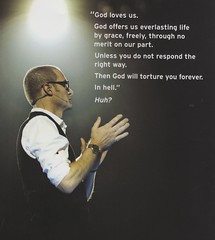
It continues to be suggested that Rob Bell is just another "Christian brother" asking necessary questions. To the latter, I didn't find his questions to be good or necessary. To the former, I'll not say directly but I will say I agree with Mike
Wittmer's assessment that Bell's on a different page.
LW [Love Wins] is dangerously wrong about hell and post-mortem salvation, but these issues are merely symptoms of a deeper and more serious problem: LW presents a different gospel.
Many readers miss this because LW says that Paul says that Jesus “paid the price for our sins, so that we could go free” (126). Isn’t this the traditional, evangelical understanding of the gospel? No, and here’s why:
1. LW says that this “courtroom” scene of a guilty party going free is merely an analogy or simile that the first century Christians used to describe the cross. They weren’t describing what God actually did on the cross—a truth that would be true for all times and cultures—but were merely describing the cross “in language their audiences would understand” (128). “What the first Christians did was look around them and put the Jesus story in language their listeners would understand. It’s like this… It’s like that” (129). In response, evangelicals would say that Paul’s doctrine of justification is more than a human analogy. It isn’t merely “like this” or “like that.” Rather, it is precisely what God actually was doing on the cross.
2. LW suggests that this evangelical “analogy” is no longer appropriate for us. If the theories of the atonement are merely human descriptions of the cross, then it makes sense that our understanding of the atonement would change as our culture changes. And so LW concludes that “the sacrificial metaphor”—where Jesus bears our sins in our place—no longer resonates with us, for we no longer live in a world where people sacrifice things to appease the gods. LW says “there are pockets of primitive cultures around the world that do continue to understand sin, guilt, and atonement in those ways. But most of us don’t” (128-29).
So LW implies that modern people have grown beyond this traditional understanding of the cross. It’s rather “primitive” to “continue to understand sin, guilt, and atonement in those ways.” LW not only misses the point of Jesus’ sacrifice—the cross was the fulfillment of the Jewish sacrificial system rather than the correction of misguided pagan sacrifices—it manages to praise Paul’s “analogy” even as it dismisses it. LW explains:
“The point, then, isn’t to narrow it to one particular metaphor, image, explanation, or mechanism. To elevate one over the others, to insist that there’s a ‘correct’ or ‘right’ one, is to miss the brilliant, creative work these first Christians were doing when they used these images and metaphors. They were reading their world, looking for ways to communicate this epic event in ways their listeners could grasp” (129).
Here’s the point: while LW does mention that Paul said that Jesus died to pay for our sins, it quickly dismisses this as merely a human analogy that no longer speaks meaningfully today (except perhaps among “primitive” people). What model or theory of the atonement does LW put in its place? Existentialism. Modern people may not appreciate the “sacrificial metaphor,” but they do understand existential angst. This is the lens through which LW interprets the cross, and as I explain in Christ Alone, this contemporary lens produces a different gospel—one that is too weak to keep anyone from going to hell.
 It continues to be suggested that Rob Bell is just another "Christian brother" asking necessary questions. To the latter, I didn't find his questions to be good or necessary. To the former, I'll not say directly but I will say I agree with Mike Wittmer's assessment that Bell's on a different page.
It continues to be suggested that Rob Bell is just another "Christian brother" asking necessary questions. To the latter, I didn't find his questions to be good or necessary. To the former, I'll not say directly but I will say I agree with Mike Wittmer's assessment that Bell's on a different page.
No comments:
Post a Comment